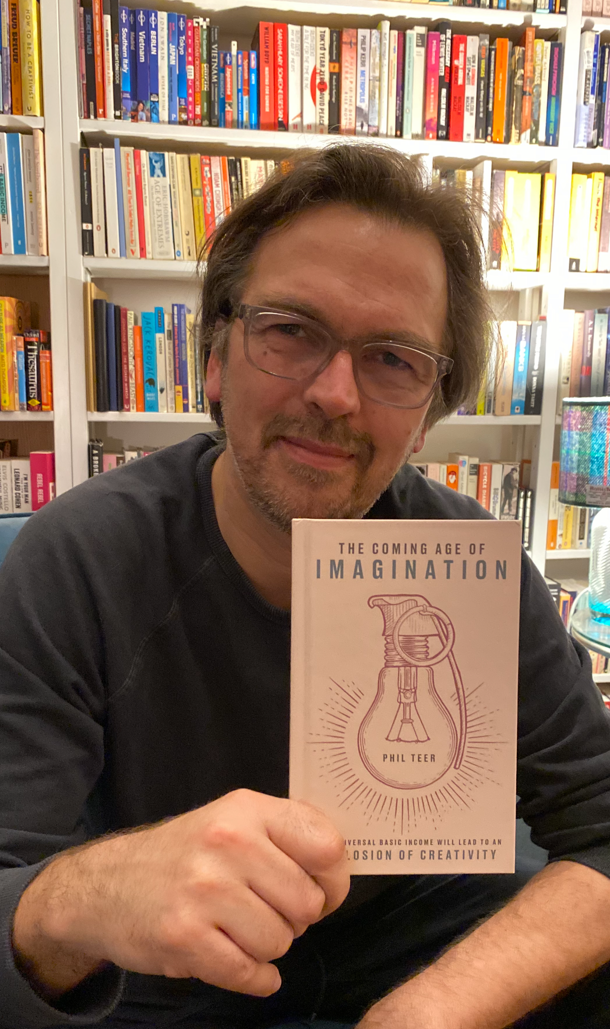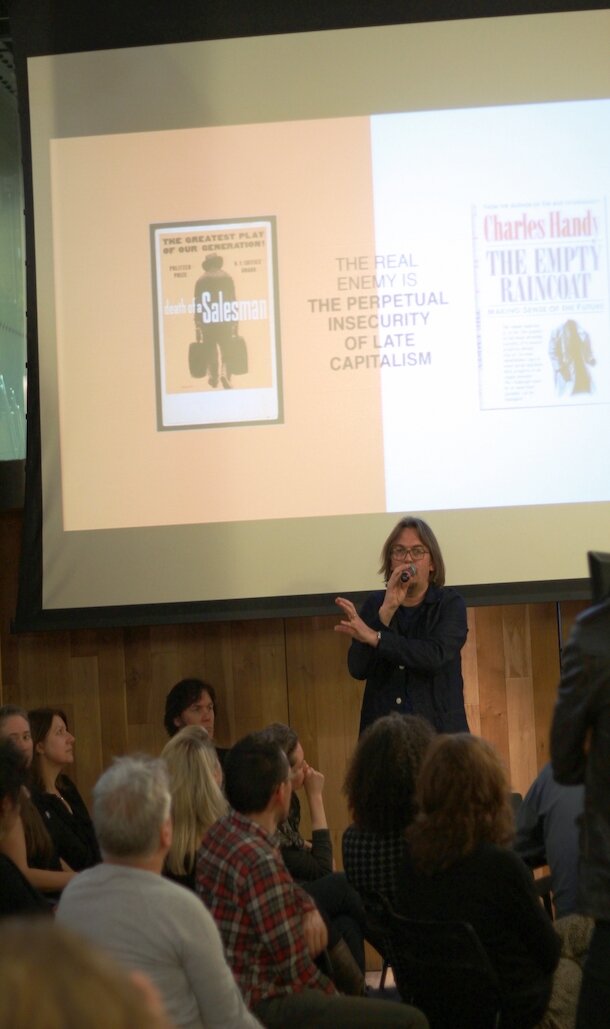The Coming Age of Imagination - Phil Teer's new book on creativity and universal basic income, inspired by A/UK
Above are two fine pictures of “mission marketer” (and great A/UK pal) Phil Teer. Between them they tell a lovely story about The Alternative UK’s impact in the wider world.
On the left, Phil is proudly holding his new book The Coming Age of Imagination: Why Universal Basic Income Will Lead To An Explosion of Creativity (Amazon link, but available everywhere). On the right is Phil performing a presentation on UBI we asked him to do for our opening A/UK event in Kings’ Cross Impact Hub, March 1st, 2017 (see our original report).
In the opening chapter of The Coming Age…, Phil connects the two pictures:
Early in 2017 I had coffee with Pat Kane and Indra Adnan. I had known Pat for years, since he had interviewed me for his book, The Play Ethic. Pat and Indra were launching The Alternative UK. They described it as a political platform, not a party. It would develop new political ideas.
Pat and Indra were inspired by Alternativet, a Danish centre-left political party which had launched a couple of years earlier. AIternativet had toured the towns and cities of Denmark, running workshops or political laboratories where citizens, artists and politicians came together to crowdsource a fmanifesto. They did exceptionally well in the 2015 i elections, winning 4.8 per cent of the vote, electing nine deputies and becoming the sixth biggest party. One of Alternativet's policies was universal basic income.
Pat and Indra asked me to come to the launch event and talk about how I would sell the idea of basic income. The launch event, or 'friendly' as it was called, was electrifying. A couple of hundred people were crammed into a social entrepreneurs workspace in London's King's Cross. Actors, musicians and poets performed and political entrepreneurs explained their ideas and projects.
At times the creative tension was palpable. At one point a fight seemed to break out: two young black blokes were arguing. After a few uncomfortable moments it became clear they were actors. Their argument about territorial space at a bus stop ended in violence. Knife crime is a burning issue in London.
AnnabeIIe Macfadyen, a founder of Flatpack Democracy, spoke of how a group of neighbours and friends in the town of Frome in Somerset stood as independents and took control of the council. Then I presented my strategy for selling basic income.
Standing in the centre of the room, with the audience all around me, clutching a microphone to my chest, with my slogan-heavy presentation flickering away behind me, it felt like the place was fizzing with creative energy.
My month-long deep dive into universal basic income had been like finding a door in your house you had never noticed and opening it to discover a huge space full of fantastic stories. Here was an idea so simple it had been inspiring people to its cause for thousands of years and I had barely heard of it. Here was a mechanism to raise people out of poverty and give everyone a stronger foundation on which to build their lives. It was a beautiful idea, it was utopian but practical and it was very relevant to our times.
To work out how to sell basic income, I first had to identify a universal benefit that would appeal to as many people as possible. Some would back the idea purely for altruistic reasons. They would want to be the generation that ended poverty. Unfortunately, not a lot of people would be motivated to act purely on behalf of others. Altruism alone woidd not be enough. Also, it felt wrong to present basic income as charity; as we shall see, it is a powerful economic tool, not a handout.
When financial precarity is removed from someone's life, what do they do? I had recently been working with a few tech start-ups. founders were from very well-off backgrounds. They had a private income behind them but they didn’t spend their life on holiday, they set up businesses.
I had also been working with companies in the music business. There was talk of a decline in working-class bands because you need money to be able to afford drop out for a year or two. It felt safe to hypothesise that with a basic income in place we might have more entrepreneurs and bands from more diverse backgrounds.
That basic income would free people up to be more creative, adventurous and risk-taking, to pursue their talents and to invest time in new initiatives felt like an insight with widespread relevance. After all, we are all good at something.
It also felt like a necessary idea. In 2017, nine years after the Crash, nine years of grinding austerity, with Brexit on the horizon and no sign yet of meaningful economic recovery, an idea that could stimulate a huge wave of creativity and entrepreneurialism must be relevant.
The Alternative UK talk went down well and afterwards I discovered that basic income wasn't for letting me go. Rather than move on, I was still working through the implications of the idea, getting more and more enthusiastic about it. Once basic income gets its claws in you, it won't let go.
The rest of the book is equally engagingly written, takes you through the components of UBI, and also lays out the elements of a campaign manifesto (and messaging) that might convince a voting populace to take it on board.
It’s an intriguing time for Phil’s book to come out - with one recent British Election behind us where UBI was floated by the Labour Party and Greens, neither of them getting anywhere near power. And with Andrew Yang’s speculative campaign for President probably also coming to an end, largely based on his advocacy of basic income (which you can see Yang do, in this embed from Bloomberg, Jan 29th. Also, from the same month, read this Atlantic overview of Yang’s campaign).
We hope to properly review The Coming Age of Imagination (or have reviewed by someone else) in the next few weeks. But in the meantime, buy it (it’s also beautifully pocket-sized, eminently portable). We’re proud of Phil, and very happy to have been its initial inspiration.



